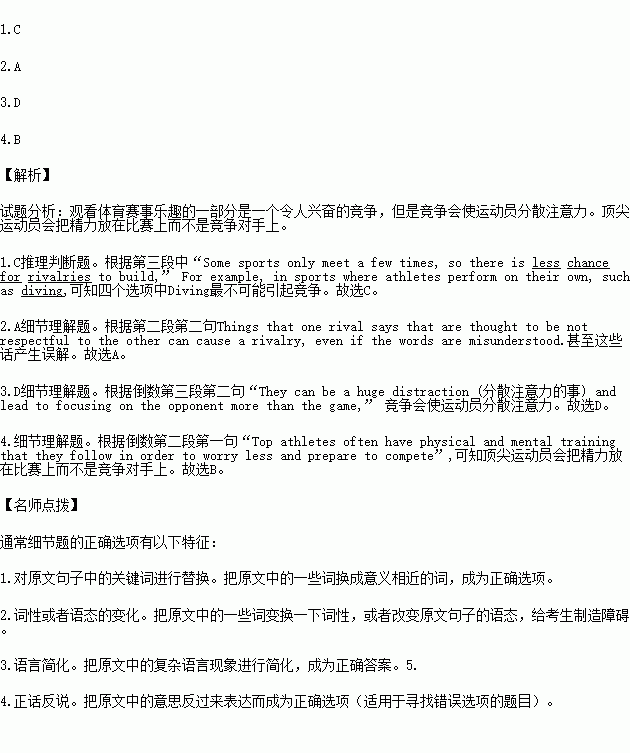题目内容
Part of the fun of watching sports events is following an exciting rivalry (竞争关系).
But where do all these rivalries come from?
Some rivalries start because athletes spend a lot of time close to opponents (对手).
Other rivalries get personal. Things that one rival says that are thought to be not respectful to the other can cause a rivalry, even if the words are misunderstood. And sometimes, rivalries grow just because the athletes don’t like each other’s personalities.
Some sports may also be more likely than others to cause rivalries. “Some sports only meet a few times, so there is less chance for rivalries to build,” For example, in sports where athletes perform on their own, such as diving, rivalries might also take longer to appear than in sports in which athletes compete at the same time. But in tennis, players often face each other, and rivalries are more likely to happen.
So do the rivalries do good or harm to the athletes?
Some believe that rivalries can be a good thing because they encourage athletes to try harder to win. But rivalries can also become too personal, taking athletes’ attention away from their sports.
Keegan agreed that rivalries often do athletes more harm than good. “They can be a huge distraction (分散注意力的事) and lead to focusing on the opponent more than the game,” he said.
“Top athletes often have physical and mental training that they follow in order to worry less and prepare to compete”, Gould further explained. An important part of that preparation is preventing from distractions, including rivalries.
“The better athletes don’t care too much about a rivalry – they try to treat every competition the same,” Gould told LiveScience.
1.According to the article, which of the following sports is least likely to cause a rivalry?
A. Tennis. B. Swimming. C. Diving. D. Soccer.
2.Which of the following statements is TRUE according to the article?
A. Rivalries between athletes may result from misunderstandings.
B. The more often you meet your opponent, the more you dislike him or her.
C. Rivalries mainly come from a dislike for each other’s personalities.
D. Audiences easily get bored if there are few rivalries in a competition.
3.Why does Keegan think rivalries could do more harm than good to athletes?
A. Rivalries could result in physical and mental suffering.
B. Rivalries could cause athletes to worry needlessly.
C. Rivalries could drive athletes to train too hard.
D. Rivalries could distract athletes from their sports.
4.In Gould’s eyes, top athletes ______.
A. care little about their competition
B. focus more on the game than on their opponents
C. treat every competition as daily training
D. take every possible opportunity to become stronger

